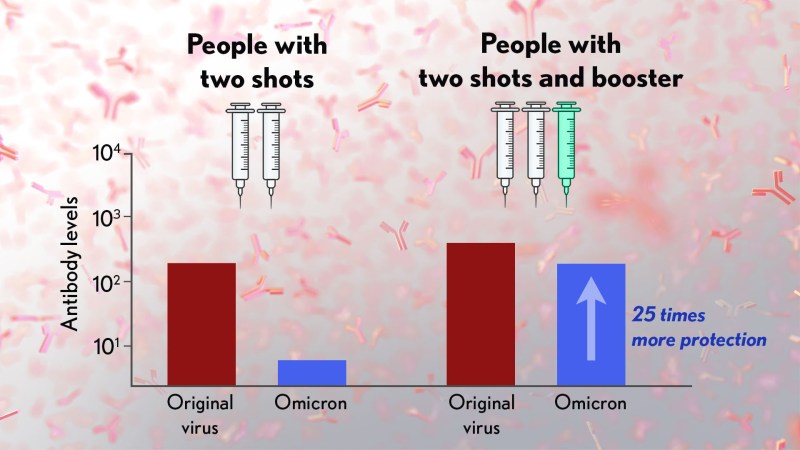Since the first COVID-19 mRNA vaccine was approved on December 11, 2020, investigations have revealed that unvaccinated people are five times more likely to become infected and ten times more likely to be hospitalized or die from COVID-19 than those who have been fully vaccinated.

However, research conducted in Israel and the United States found that vaccine-induced immunity to the SARS-CoV-2 coronavirus fades after six to eight months. This is especially concerning as more people are becoming infected with the more contagious Omicron form, which was originally discovered in South Africa in November.
Omicron has been found in 77 countries so far. The variant is found in more than 37 states in the United States, accounting for 3% of all cases; the rest are still Delta. However, it currently accounts for the bulk of SARS-CoV-2 infections in London, and it is the dominant strain in South Africa.
Boosters, on the other hand, can restore antibody levels to their highest levels, giving you better protection from Omicron.
"Vaccines help protect you, or at the very least keep you from dying from the disease," says Leo Poon, a virologist at the University of Hong Kong who discovered some of the first Omicron cases outside of South Africa. "And having a booster will be good regardless of whether it's Omicron or Delta."
What exactly is a booster?
COVID-
Synthetic versions of the virus's spike protein—the portion of the virus that lets it adhere to human cells—are used in 19 vaccines to train our immune systems to develop antibodies. If the virus is later encountered by a vaccinated person, the antibodies recognize it and bind to the spike protein, preventing infection.
The first dosage of an mRNA vaccine primes the cells to produce antibodies, and the second dose matures and strengthens those antibodies, allowing them to bind much more firmly to the spike protein, preventing it from binding to human cell receptors. A single dosage of the Johnson & Johnson vaccination was sufficient to generate antibodies against the original coronavirus.
Antibody levels do gradually diminish for all COVID-19 vaccines approved to date, according to Maria Elena Bottazzi, a vaccinologist at Baylor College of Medicine's Texas Children's Center for Vaccine Development. Boosters can help with this.
The US Centers for Disease Control and Prevention presently recommends the booster dose for anybody aged 18 and up. People should be boosted six months after receiving their second dose of the Pfizer or Moderna mRNA vaccinations, or two months after receiving the J&J vaccine, according to the CDC. Booster shots are also advised by the CDC for 16- and 17-year-olds who have received two doses of the Pfizer vaccine.
Scientists are still gathering data to see how long the booster's immunity lasts and whether more will be required in the future.
How does Omicron affect vaccines?
Omicron appears to dodge antibodies created by two doses of the Pfizer or Moderna vaccines, or a single dose of the J&J vaccination, especially as antibody levels in the blood drop since it has accumulated over 30 changes in the spike protein alone compared to the original virus.
The effectiveness of two doses of the Pfizer or AstraZeneca vaccines in preventing COVID-19 symptoms from Omicron decreased to less than 40% after 15 weeks in a U.K. research that hasn't been peer-reviewed. The Pfizer vaccination against Delta had a slower fall in effectiveness, although it was still only 60% effective after 25 weeks.
Antibodies' ability to neutralize Omicron in people vaccinated with the two-dose Pfizer vaccine or two doses of Moderna's vaccine also shows a steep decline in people vaccinated with the two-dose Pfizer vaccine or two doses of Moderna's vaccine in other preliminary studies from South Africa, Israel, and France.
Boosters are still active in the fight against Omicron.
The good news is that a booster dose of Pfizer's vaccine increases antibody levels by a factor of 25, which should be sufficient to neutralize Omicron. A booster dose of Moderna's vaccine increased Omicron neutralization when compared to the two previous doses alone.
"The two doses with decreasing immunity mean there's no protection within a few months after the two doses," says Peter Hotez, a Baylor College of Medicine physician and vaccine scientist. "At the very least, the booster provides you a 70 percent boost."
In other experiments, people's antibody levels against Omicron rose to the protective level regarded sufficient to prevent a COVID-19 infection after receiving any mRNA booster dose.
During a White House COVID-19 report on December 15, Anthony Fauci remarked, "Our booster vaccine regimens work against Omicron." "A variant-specific booster is not required at this time," Fauci noted.
However, much of the evidence so far comes from laboratory studies, and immunity entails more than antibodies. More real-world data will be needed to determine how successful current Omicron vaccinations will be in the long run.









